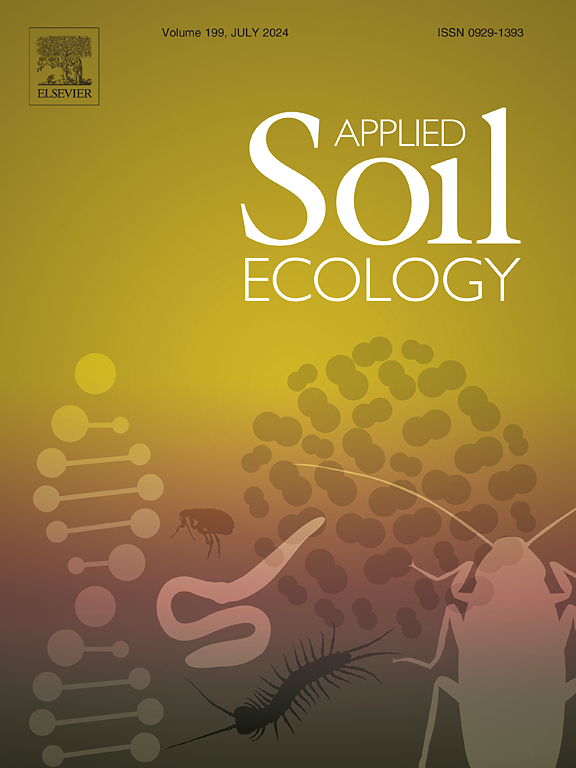Rhizosphere transplants from Guinea grass support the yield and modulate the microbiota of chili and rice root systems depending on the plant's variety and growth stage
IF 4.8
2区 农林科学
Q1 SOIL SCIENCE
引用次数: 0
Abstract
Biofertilization by rhizosphere microbiome transplant (RMT) is an emerging approach of plant microbiome engineering, for its potential to reduce the input of synthetic chemicals, hence preserving soil ecosystem and human health. However, its feasibility and outcomes need deeper investigation through field studies. This work aimed at evaluating the efficacy and the ecological impact on soil microorganisms of a biofertilizer that could be self-produced by farmers in Sri Lanka through RMT from Guinea grass (Panicum maximum), a widespread weed able to adapt to harsh conditions. Root wash (RW) and arbuscular mycorrhizae (AMF) obtained from the root system of Panicum were separately supplied to chili pepper and two local varieties of rice, Suwadel and Kuruluthuda. Decreasing doses of chemical fertilizer were also applied, combined with the inocula or as separate controls. In chili and in rice var. Suwadel all the biofertilization treatments improved the crop productivity compared to the non-treated controls or to the plants supplemented only with the minimum dose of chemical fertilizer. RW and AMF applied alone or supplied with 50 % of the optimal fertilizer dose resulted in yields comparable to 100 % chemical fertilization, suggesting the potential to reduce its input by half. Microbiome transplant showed an impact on bacterial and fungal communities at flowering stage, with the enrichment of Bacillaceae, Exiguobacteraceae, Micrococcaceae, Trichocomaceae and Aspergillaceae compared to non-treated plants. Our results indicate promising results of RMT in terms of crop yield improvement in field conditions, with structural changes in the rhizosphere microbiome related to the recruitment of beneficial microorganisms.
根据植物的品种和生长阶段,几内亚草的根际移栽支持产量并调节辣椒和水稻根系的微生物群
根际微生物组移植(RMT)生物施肥是一种新兴的植物微生物组工程方法,因为它有可能减少合成化学品的投入,从而保护土壤生态系统和人类健康。然而,其可行性和效果需要通过实地研究进行更深入的调查。这项工作旨在评估一种生物肥料的功效和对土壤微生物的生态影响,这种生物肥料可以由斯里兰卡农民通过RMT从几内亚草(Panicum maximum)中自行生产,几内亚草是一种能够适应恶劣条件的广泛存在的杂草。本研究将从番荔枝根系中提取的根洗液(RW)和丛枝菌根(AMF)分别用于辣椒和两个当地水稻品种Suwadel和Kuruluthuda。还施用了减少剂量的化肥,与接种剂联合施用或单独对照施用。在辣椒和水稻品种Suwadel中,与未处理的对照或仅添加最低剂量化肥的植株相比,所有生物肥料处理都提高了作物生产力。单独施用RW和AMF或只施用50%的最佳肥料量,其产量可与100%施用化学肥料相当,表明其投入可减少一半。微生物组移植对开花期的细菌和真菌群落产生了影响,与未处理的植物相比,芽孢杆菌科、出口杆菌科、微球菌科、毛霉菌科和曲霉科的细菌和真菌群落增加。我们的研究结果表明,在田间条件下,RMT在作物产量提高方面取得了令人鼓舞的结果,根际微生物组的结构变化与有益微生物的招募有关。
本文章由计算机程序翻译,如有差异,请以英文原文为准。
求助全文
约1分钟内获得全文
求助全文
来源期刊

Applied Soil Ecology
农林科学-土壤科学
CiteScore
9.70
自引率
4.20%
发文量
363
审稿时长
5.3 months
期刊介绍:
Applied Soil Ecology addresses the role of soil organisms and their interactions in relation to: sustainability and productivity, nutrient cycling and other soil processes, the maintenance of soil functions, the impact of human activities on soil ecosystems and bio(techno)logical control of soil-inhabiting pests, diseases and weeds.
 求助内容:
求助内容: 应助结果提醒方式:
应助结果提醒方式:


